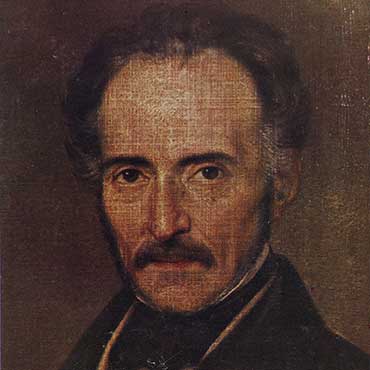Albèri was born in Padua in 1807, the son of an artist originally from Rimini, who had moved in order to teach drawing at the University. He studied law in Bologna, where he had moved with his family while still very young, but his interests lay in the field of historical studies rather than in the legal profession. Bologna was the city with which he had the strongest links, where he absorbed the ideals of the Risorgimento and, despite his strong religious beliefs, he did not accept the blind intolerance of the policies of the papal administration. He moved to Florence, where he later married Virginia de Baillou, a Flemish noblewoman. He contributed to the “Antologia”, and thus came into contact with Giovan Pietro Vieusseux, who subsequently became a close friend.
After being arrested and exiled for political motives in 1831, a few years later he returned to Bologna and then reappeared in Tuscany. When Vieusseux’s “Antologia” was closed down, he founded “La ricreazione”, which he edited for two years. He soon started work on some historical studies, including L’assedio di Firenze illustrato con inediti documenti (1840) and the fifteen volumes that appeared between 1853 and 1863 of Relazioni degli ambasciatori veneti al Senato durante il sec. XVI. For a number of years he was in charge of the Società Editrice Fiorentina, which he had helped to set up. Its catalogue of works (which were printed originally by Le Monnier, but later handled by the company’s own printer) was focused on the dissemination of the classics of Italian literature and the circulation of essays on history and politics, including some that he translated himself. He founded and directed “Il mondo contemporaneo”, a work in instalments.
His political views became more moderate and dispassionate and he moved closer to the court of the Habsburg-Lorraine Grand Duke of Tuscany, mixing with the nobility of Florence and the most prominent personalities of the time. When, on the occasion of the third meeting of Italian scientists, Grand-Duke Leopold II sponsored the project for a new edition of the works of Galileo, based on the documents gathered together in the Galilean archive in the then Biblioteca Palatina, the work was entrusted to Albèri himself, with Vincenzo Antinori as consultant and Celestino Bianchi and Pietro Bigazzi as assistants. The undertaking was blighted by a public row on the actual discovery among Galileo’s manuscripts of observations on the Medicean Stars, which went beyond the limits of a dispute within the editorial group. This dispute led to the early resignations of Antinori and of Bigazzi and dragged on from 1842 to 1856. Another reason for the delay was caused by the wars of independence, which removed directors and collaborators from the work.
Politically Albèri was a follower of Gioberti and the Neo-Guelph movement, as is clear from his Del Papato e dell’Italia (1847), and he continued to be a federalist and strongly against anticlerical and unitarian ideas. He enlisted voluntarily in the papal army, fought in the First War of Independence and negotiated the surrender of Vicenza. However, during the Second War, although he was initially favourable to the exile of the Habsburg-Lorraine dynasty, he later gave in to his own antiunitarian feelings and his concerns for the independence of the Pope. This was a position in clear contrast with the politics of Piemonte and the ideas of his former friends from the circle of Vieusseux, who, although never denying the man the respect that he had given him before, now saw him as a cleric in the pocket of the Grand-Duke.
Disappointed at the lost hopes of a restoration of the Habsburg-Lorraine dynasty in Tuscany and grieving for the loss of his wife and, even more so, for the death of his son Carlo, who was fatally wounded at the Battle of Custoza, Albèri spent the years after the unification as a hardline Catholic: he took part in international conferences from an antiliberal position, concerned for the preservation of the Papal States, of their temporal power and the dogma of Papal infallibility.
Albèri, as philologist and publisher, can be seen as the conceptual opposite of Favaro, who never stopped criticising him, sometimes bitterly and fiercely. His edition of Galileo turned out to be so unsatisfactory that a few decades after the publication of the last volume it was considered necessary to start a new one from scratch. His edition, planned with “rash speed”, as well as “the continual changes of plan” in the course of the work, suffered from “a lack of preparation on the part of the editors”, who, in the opinion of Favaro, were “studying the writings of Galileo as they laid eyes on the proofs”. The organisation by subject, which hindered the opportunity to see works and documents in context, the errors of transcription and the arbitrary cuts, the deliberate omissions of many documents and the changes that “violated” the text, the deletion of entire passages “where there was a risk of offending the authority of the Church”, rendered unusable the so-called “first complete edition”, which was anything but complete, and could not “satisfy the legitimate expectations of scholars”. Eugenio Albèri died in Vichy in 1878.


